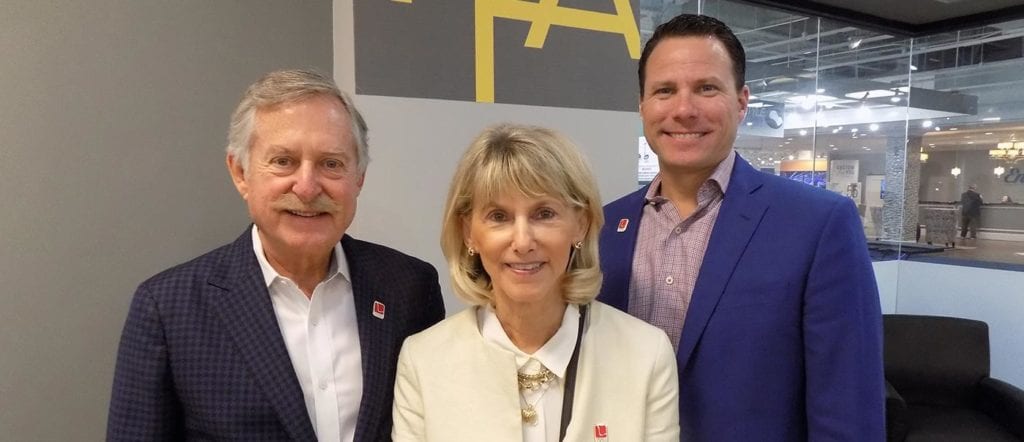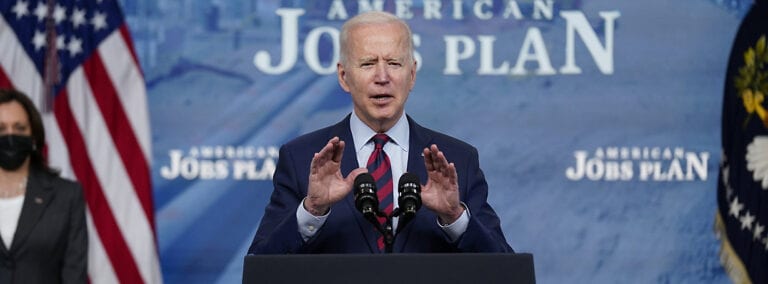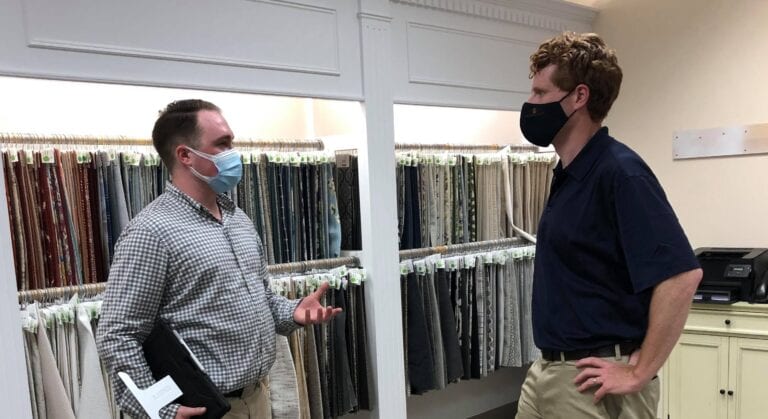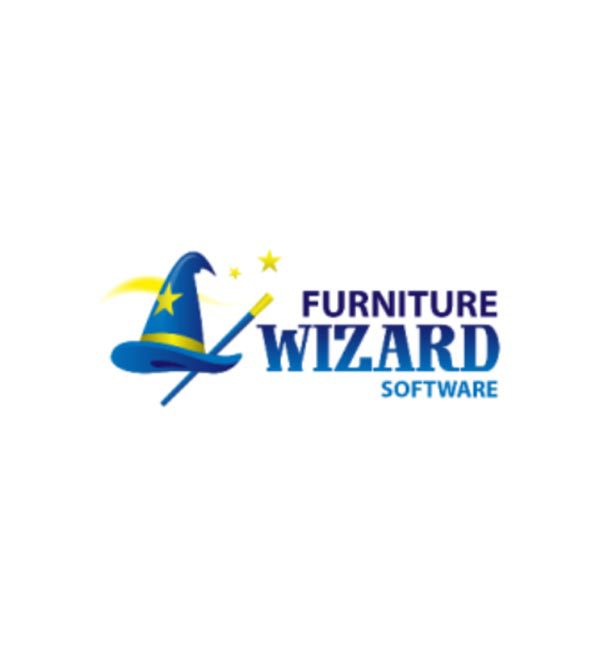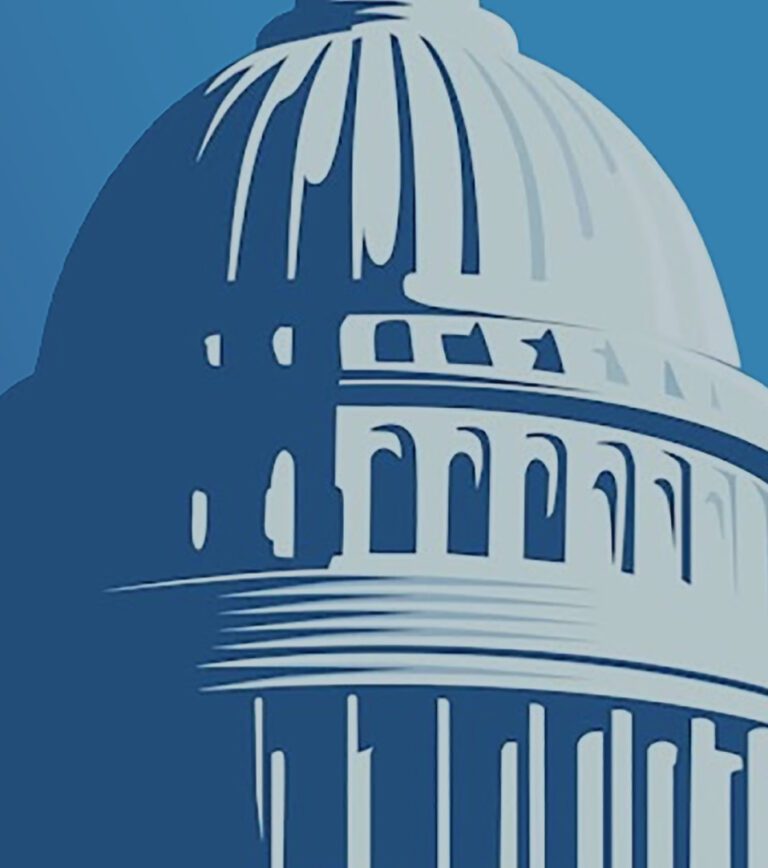Featured Story | Political Update | Retailer News Watch | State Reports

HFA members in Florida want tax fairness
Home Furnishings Association members in Florida are still looking for tax fairness. Florida is one of only two sales-tax states – the other is Missouri – that doesn’t require remote online vendors to add the tax to purchases by its residents. The failure leaves Florida retailers at a disadvantage against giant online competitors based in other states.
“We pay local taxes,” said Andrew Koenig, president of City Furniture, which is based in Tamarac and operates 20 stores in south and central Florida. “We pay property taxes. We pay a lot of taxes. We’re happy to do so.”
But out-of-state sellers don’t pay those taxes. So, they should at least collect the same sales taxes that furniture retailers like City and Sanford-based Hudson’s Furniture, with 18 stores across Central Florida, must add to customers’ bills.
“A level playing field is a great thing when it comes to business in America,” Hudson’s CEO Joshua L. Hudson said. “If someone else has an advantage, especially in a gray area like collecting sales tax, then the game is in their favor.”
A key state legislator who agrees is Sen. Joe Gruters, a Sarasota Republican. He introduced a bill, SB 126, meant to achieve what he calls “e-fairness.” Like measures enacted in many other states since the Supreme Court’s 2018 ruling in South Dakota v. Wayfair, the bill would require vendors like Wayfair to collect Florida’s 6-percent state sales tax on purchases and remit the funds to the state treasury in Tallahassee.
“I feel like this helps the local business compete and gain back some market share from e-commerce-only companies,” Hudson said.
Gruters has tried before, however. His previous attempt was defeated by lawmakers who said his proposal amounted to a tax increase and argued it would hurt the state’s economy.
Gruters and business voices refute that. The sales tax isn’t new, the senator points out. It is owed but currently not paid on most online transactions. The state loses as much as $750 million in revenue each year, he says.
“Basically, there’s a 6-percent advantage for our online retailers over our brick-and-mortar retailers,” Gruters told FlaPol last month. “No, this is not a tax increase, first and foremost.”
“Some legislators think this is a new tax,” Rick Howard, president of Sklar Furnishings in Boca Raton, said. He has been to Tallahassee, where he has tried to educate some of those lawmakers. Florida consumers owe sales tax on out-of-state purchases. But they rarely pay, ignoring the law. Technically, they are subject to being audited and penalized.
“It’s better to clean this up than to criminalize it,” Howard said, calling Gruters’ bill a potential win-win-win. It would increase revenue for the state, level the playing field for retailers and put consumers on the right side of the law.
“The fact that the Florida legislators have not acted after the Supreme Court ruling goes to show how out of touch some of our elected officials are when it comes to the mainstream of America,” said Wogan S. Badcock III, executive vice president of W S Badcock Corp., which is based in Mulberry and operates stores throughout the state. “Retail owners need to remember this around the next election time.”
Badcock, a member of HFA’s Government Relations Action Team, added: “For well over 35 years, HFA has been in the forefront in this fight about fairness in the marketplace.”
So is the Florida Retail Federation. It supports Gruters’ bill, and a companion House bill, touting them as “Fairness for Florida.” “This legislation will level the playing field and restore the free market by enforcing the law,” FRF says.
It has produced a short, easy-to-understand video explaining the issue.
To Koenig, whose business also supports its communities through many charitable causes, e-fairness is just logical.
“Eventually we’ll get wise on this,” he said. Rather than depress the economy, the additional sales-tax collections will help the state address additional needs, whether that’s education or environmental protection.
“Florida’s a great state and will continue to thrive,” Koenig said.
And e-fairness will put Florida retailers on more of a level playing field with out-of-state online competitors, helping them pay salaries, generate state and local taxes and build stronger communities.
The additional revenue could address unmet needs in the state budget or reduce other taxes, such as the tax on rents paid for retail property.
That tax, Howard said, “really is a whack” to many brick-and-mortar retailers who already operate at a disadvantage against online competitors.
Tell your legislators to support Florida SB 126 and HB 159
Sen. Joe Gruters’ SB 126 was approved by the Senate Commerce & Tourism Committee Oct. 15. It needs to proceed through two more committees before it can be heard on the Senate floor in 2020.
There has been no movement this year on HB 159, introduced by Rep. Chuck Clemons.
HFA members should contact their legislators (find House and Senate members) and tell them to support e-fairness. They should explain what their businesses do, how many workers they employ, how much they pay in taxes and everything else they do to support their communities. The state of Florida should protect Florida businesses.
In addition to Gruters, co-introducers of SB 126 were Senators Ed Hooper, George Gainer, Dennis Baxley, Keith Perry, Gayle Harrell, Ben Albritton and Linda Stewart. Co-introducers of HB 159 were Representatives Melony Bell, Heather Fitzenhagen, Mike Greico, Sam Killebrew and Anthony Sabatini. They all deserve thanks for backing Florida retailers.

By Chris Andresen, vice president of Dutko Government Relations
U.S. House Democrats formally voted last month to continue their impeachment inquiry into President Donald Trump. The Democrats’ investigation is ongoing, but they were under pressure from Republicans to take a formal vote and make the process more transparent. The vote outlined various procedural points moving forward in terms of witnesses being called to testify and transcripts being publicly available. House Democrats have since released several transcripts of witness depositions conducted in private.
Only two Democrats voted against the impeachment inquiry resolution, with one Independent, Justin Amash from Michigan, voting with the Democrats. All Republican House members voted against the resolution. That sets the stage for an extremely partisan process, with a potential impeachment vote in the House later this year. The process in the Senate is more “formal,” with Supreme Court Chief Justice John Roberts presiding over a “trial.” Given current information, President Trump would not be convicted with a two-thirds vote in the Senate.
Once Democrats and Republicans move past impeachment, they can try to get back to legislating by focusing on government funding and other important policies that need reauthorization.

Tax Issues
HFA has joined other business groups in pushing for a “technical correction” to the 2017 Tax Cuts and Jobs Act, which created a new depreciation schedule for “Qualified Improvement Property,” or QIP. The intent of the law was to allow a 15-year recovery period and 100 percent bonus depreciation for certain improvements to retail property. The wording of the final bill, however, extended the recovery period to 39 years and made QIP ineligible for 100 percent bonus depreciation.
Bills filed in both the House and Senate that would correct this error have attracted broad bipartisan backing, but not support from House and Senate leaders. The best path forward might be to attach a QIP fix to a larger legislative funding package, but chances may be dimming given the current impeachment focus.
Furniture stability
The full House of Representatives passed the STURDY Act via voice vote in mid-September. The bill was passed under “suspension of the rules,” meaning it was noncontroversial – no recorded vote was taken. The measure moved to the Senate.
In the meantime, the Consumer Products Safety Commission is moving forward with a proposed rulemaking on furniture tip-over. Details may emerge later this year. As part of that process, the commission recently completed testing of nearly 200 products and has announced several recalls. ASTM also revised its voluntary standard to cover clothing storage units down to 27 inches in height.
We are continuing to monitor this issue on several fronts – congressional, regulatory and voluntary.
CPSC nominations
Bob Adler, a Democrat, is now the acting chairman of the Consumer Products Safety Commission. Republican Anne Marie Buerkle’s departure at the end of October leaves a 2-2 partisan split. It is unclear whether the White House will prioritize finding a replacement for Buerkle, given the many vacancies across the federal government, or nominate a Republican chairman.
Trade
Following the 13th round of in-person negotiations, President Trump and Chinese Vice Premier Liu announced a limited “Phase One” deal, which paused scheduled tariff increases on Oct. 15. In exchange, China agreed to:
- Increase limits on foreign ownership in its financial services sector.
- Increase certain intellectual property protections.
- Increase purchases from U.S. farmers. President Trump said this would amount to $40 billion to $50 billion in new purchases.
- Refrain from de-valuing currencies.
The details of this agreement will be finalized in the coming weeks, but a planned signing ceremony at the November Asia-Pacific Economic Cooperation Leaders’ Summit was disrupted when host Chile had to cancel the event over political unrest in its country. The U.S. and China sides are trying to find another venue to complete the deal – potentially in Alaska or Hawaii.
There may be another round of negotiations at that meeting, which could include planned Dec. 15 tariffs. The U.S. and China have struck similar agreements only to have them fall apart when getting into the details. In recent days, the Chinese have asked for greater certainty on tariff delays, especially on the planned 15 percent tariff on consumer goods scheduled to go into effect Dec. 15.
EPA formaldehyde rule
Beginning March 22, all furniture containing composite wood products and formaldehyde resins was required to be labeled according to the Environmental Protection Agency TSCA Title VI emissions standards. HFA has worked on this rulemaking for several years to ensure that retailers understand the new requirements under the EPA rule. The previous California Air Resources Board standard only applied to products sold in California.
The EPA recently published its final technical corrections to the EPA rule, bringing it more in line with the current CARB standard. The EPA also published its intent to consider a list of 20 high-priority chemicals, including formaldehyde, for a TSCA risk evaluation. This could have further complications within the existing composite wood product rule, and we are continuing to determine next steps.
Upholstered furniture flammability
The House Energy and Commerce Committee approved the Safer Occupancy Furniture Flammability Act (SOFFA), which would create a national upholstered furniture flammability standard based on the existing California Technical Bulletin 117-2013. Democratic and Republican leaders on the committee discussed possible changes before floor consideration, but there is no indication on what changes would occur.
The Senate Commerce Committee also approved SOFFA through committee via voice vote. That measure now moves to the full Senate for consideration, but timing is unknown. This effort has been supported by a coalition of industry (including HFA), firefighters, consumer and environmental groups.
Hours of service
The HFA has long supported common-sense safety regulations for motor carriers, but we disagreed with the 2013 Hours of Service regulation. Recently, the Trump administration issued proposed changes to the existing Hours of Service regulation, which will allow for more flexibility in the trucking industry.
First, truck drivers could in the future use their 30-minute breaks that they receive every eight hours when they are on duty but not driving, such as when they are waiting for a truck to be loaded. Previously, the drivers had to go formally “off duty” to use the break, which industry has consistently pushed back on.
Under the proposed rules, truck drivers can also split their required 10 hours of off-duty time into two breaks, a seven-hour break for sleeping and another three-hour break when they choose. Under current law, they must take one 10-hour break after a day of driving. Drivers could also take an off-duty break of between 30 minutes and three hours during a 14-hour driving window under the proposed rules, but they still must take a full 10 hours at the end of that shift. Additionally, workers can also extend their 14-hour driving window by two hours if conditions are “adverse.”
Finally, the rules also propose extending short-haul truckers’ maximum driving time from 12 hours to 14 hours and moving the distance limit for drivers before they must take a break from 100 “air miles” to 150 “air miles.”
The HFA has submitted comments in support of these proposed changes. Now, the Department of Transportation will consider all comments and publish a final rule at some point – likely in 2020.
ADA website accessibility
The Supreme Court declined to hear a case involving Domino’s and allegations its website is not accessible under the Americans with Disabilities Act. Many industries viewed potential Supreme Court consideration as the opportunity to clear up any question about whether the ADA applies to websites. Lower courts have ruled that it does, and the U.S. Department of Justice has also affirmed that opinion.
However, the Department of Justice has not set clear rules for compliance, creating uncertainty for businesses that want to comply and provide access to those with disabilities. HFA has asked the DOJ to provide guidelines so that furniture retailers know exactly how to build their websites to accommodate all customers.

News of interest to HFA members in Alaska, California, Florida, Kentucky, Louisiana, Massachusetts, New Jersey, New York, Pennsylvania, South Carolina, South Dakota, Texas, Washington, Wyoming and across the country.
United States
New federal overtime rules go into effect on January 1. The salary threshold for executive, administrative and professional exemptions will rise from $455 per week ($23,660 annually) to $684 per week ($35,568 annually). The “Highly Compensated Employee” exemption threshold will rise from $100,000 to $107,432 annually. Employers can use nondiscretionary bonuses and incentive payments, such as commissions, to count for as much as 10 percent of the salary threshold for the executive, administrative and professional exemptions.
Alaska
The state does not collect a sales tax, but many cities and boroughs do. One by one, they are joining a collective effort to capture taxes on purchases made by residents through remote, online vendors. Acting on their behalf, the Alaska Municipal League has created the Alaska Remote Seller Sales Tax Commission, which will hire MuniRevs, a Colorado-based software company, to collect taxes from online retailers that meet a threshold of $100,000 in sales into Alaska.
California
New regulations clarify how furniture made to comply with TB 133 will be addressed under San Francisco’s Flame Retardant Ordinance, since TB 133 was repealed in January. The regulations are posted at www.sfenvironment.org/frordinance.
The Bureau of Household Goods and Services has posted new Frequently Asked Questions regarding AB 2998, which takes effect in January. The law prohibits the sale and distribution of juvenile products, upholstered furniture, replacement components of reupholstered furniture and the foam in mattresses containing covered flame-retardant chemicals at levels above 1,000 parts per million.
Gov. Gavin Newsom last month signed AB 51, which bars businesses from requiring employees to resolve disputes through binding arbitration agreements, beginning January 1. However, many analysts think legal challenges could delay or prevent implementation. The law would “prohibit employers from entering into mandatory arbitration agreements for nearly all types of employment law claims in California,” the Fisher Phillips firm comments. “The new law could have significant impacts on California employers across all industries – if it ever goes into effect. There are significant questions around whether the new statute is invalid. We could see it scaled back or completely tossed out before ever being enforced based on an argument that it is preempted by federal law.”
Before the law is blocked, however, employers should refrain from including binding arbitration in employment contracts, some lawyers advise.
Businesses and the public have until December 6 to comment on proposed regulations implementing the California Consumer Privacy Act. State Attorney General Xavier Becerra released the tentative rules last month.
The law consists of four key elements, according to the attorney general:
- Businesses must disclose data collection and sharing practices to consumers.
- Consumers have a right to request that their data be deleted.
- Consumers have a right to opt out of the sale or sharing of their personal information.
- Businesses are prohibited from selling personal information of consumers under the age of 16 without explicit consent.
More information about the proposed regulations, public hearings and submitting comments can be found here.
Florida
The state minimum wage edges up a dime to $8.56 an hour on January 1. The raise matches the increase in the Consumer Price Index.
Kentucky
Gov. Matt Bevin promised to push for a sweeping tax overhaul, if he were re-elected Nov. 5. But he wasn’t.
The now-outgoing chief executive proposed eliminating individual and corporate income taxes and replacing the lost revenue with higher sales taxes. He also suggested scrapping the state’s estate and inventory taxes. Bevin said the state should “stop taxing the job creators and the wealth producers,” Kentucky Public Radio reported.
It wasn’t clear what impact those changes would have on furniture retailers. They would benefit by a repeal of income, inventory and estate taxes, although the impact of higher sales taxes might be negative. But Bevin’s narrow election loss to state Attorney General Andy Beshear may have ended the opportunity for significant tax changes.
Louisiana
Jefferson Parish claims Walmart.com owes it $1.8 million in back taxes on sales made by third-party retailers through its online platform. Walmart says it was not responsible for those taxes at the time the purchases were made. The Louisiana Department of Revenue has sided with Walmart. A court found in favor of Jefferson Parish, but for a smaller amount of money. The case may be heard by the Louisiana Supreme Court.
Massachusetts
There won’t be a legislative fix this year to an overtime ruling affecting furniture retailers, but there is a proposal to launch a task force review.
The issue stems from a surprising decision by the state’s highest court last spring in Sullivan v. Sleepy’s. Reversing the state’s interpretation of labor law, the court said that sales employees whose entire compensation is earned through commissions are nevertheless entitled to premium pay for work on Sundays and in excess of 40 hours per week. Legislative efforts to restore the previous interpretation were unsuccessful. Business groups hope that a task force, including representatives of retail employers and employees, can reach an agreement that makes sense for all parties.
New Jersey
The Garden State has enacted several employment law changes, including:
Beginning on Jan. 1, 2020, New Jersey employers cannot request a job applicant’s salary or benefit history during the initial hiring process. An employer may not take adverse action based on an individual’s refusal to provide salary or benefit history. However, once an employer makes an employment offer, it may then ask the applicant to sign an authorization to confirm salary history.
The state minimum wage will increase to $11 an hour on Jan. 1, 2020. It will continue to rise by $1 an hour until it reaches $15 on Jan. 1, 2024.
The Family Leave Act now covers companies with 30 or more employees, reduced from 50 employees. The law originally applied to employees who have worked for an employer for at least a year, allowing them to take leave to care for a newly born or adopted child or to care for a family member with a serious health condition. As recently amended, eligible employees may now also take leave if they become foster-care parents, introduce a new child into the family through a “gestational carrier agreement,” or are victims of domestic or sexual violence or have family members who are victims.
The definition of family member has expanded to include a child, parent, spouse, civil union partner, parent-in-law, sibling, grandparent, grandchild, domestic partner, “any other individual related by blood to the employee,” and “any other individual whom the employee shows to have a close association with the employee which is the equivalent of a family relationship.”
New York
The benefits under the state’s paid family leave act increase on Jan. 1, 2020. Currently, eligible employees can take up to 10 weeks of leave per year and draw 55 percent of their average weekly wage, up to 55 percent of the statewide average weekly wage of $1,357.11. On Jan. 1, that will increase to 60 percent of their average weekly wage, up to 60 percent of whatever is calculated to be the statewide average.
Pennsylvania
The Pennsylvania Retailers Association has asked the city of Philadelphia to delay for six months the implementation of its Fair Workweek Employment Standards ordinance. It is scheduled to take effect Jan. 1.
The measure covers retail businesses, restaurants, hotels and certain other establishments that employ 250 or more workers in 30 or more locations worldwide. It requires employers to give employees the right of first refusal to work additional hours before hiring new employees; post and provide advance written notice of work schedules; provide predictability pay for any departures from the posted schedules; and permit a rest period of nine hours between shifts.
The Pennsylvania Retailers Association says a delay is needed because, among other reasons, meeting the January 1 deadline means that implementation measures must be taken during the busiest retail season of the year when businesses add many part-time and temporary workers.
South Carolina
Amazon said in a recent financial filing that it will continue its battle with the state over $12.5 million.
The S.C. Department of Revenue contends that Amazon failed to collect taxes in 2016 on sales to South Carolina residents by independent retailers using Amazon’s online platform. Amazon was required to remit the taxes under an agreement with the state, according to SCDOR. Amazon said it never owned the goods in question and wasn’t responsible for the sales.
Amazon’s appeal to an administrative law court failed, but it vows to press on.
“We believe the assessment is without merit and intend to defend ourselves vigorously in this matter,” the company said, according to The Post and Courier of Charleston. “If other tax authorities were successfully to seek additional adjustments of a similar nature, we could be subject to significant additional tax liabilities.”
South Dakota
Since its victory in the U.S. Supreme Court’s 2018 South Dakota v. Wayfair ruling, the state has registered more than 3,400 remote online vendors, which have remitted more than $68 million in revenue, according to the S.D. Department of Revenue.
The income helps but has not overcome other economic challenges hitting the state, Revenue Secretary Jim Terwilliger told the Argus Leader.
The newspaper reported: “’We are fortunate that we had a favorable decision in the Wayfair case,’ Terwilliger said. ‘That just helps us through some of these challenging times.’ During the last fiscal year, ending June 30, the state came up about $10 million short of what the Legislature anticipated in sales tax revenue, despite the additional dollars generated through online sales. ‘There are some people that thought this would be a huge windfall of money. But we haven’t seen that at the state level,’ Terwilliger said. ‘But it has helped stabilize the revenue stream to some extent.’”
Texas
San Antonio’s Sick and Safe Leave ordinance takes effect December 1, following a four-month delay while the City Council made revisions in response to business concerns. The measure requires employers to offer 56 hours of sick time or paid time off for employees with qualifying circumstances. Those include absences due to illness or injury, medical treatment or preventative care, domestic or sexual assault and caring for a family member.
A similar ordinance is in effect in Dallas, while another measure in Austin is on hold during a legal challenge. San Antonio also could face further legal hurdles.
In Mesquite, a city of nearly 150,000 people just east of Dallas, Mayor Stan Pickett was defeated Nov. 5 in his run for a second term. Pickett owns Quality Furniture & Appliance in Mesquite and is a member of the Home Furnishings Association’s Board of Directors. Pickett served on the Mesquite City Council from 2004 to 2014 before his election as mayor in 2015. He was defeated, 52 percent to 48 percent, by another veteran council member, Bruce Archer.
Washington
Northwest Hardwoods will close its mill in Mount Vernon, Wash., this month, eliminating 70 jobs. It also will shut down a facility in Virginia, cutting another 30 jobs. The Tacoma-based company blames the trade war with China, CNBC reports.
“Our business, much like the rest of the industry, is highly dependent and has forged a large relationship selling into the Chinese market, and since the middle of last year, if you just look at year on year, sales are off 43 percent in total exports to China,” CEO Nathan Jeppson said.
Wyoming
Wyoming again ranks as best in the nation for its business tax climate on the 2020 Tax Foundation index. The state gets credit for its lack of an individual or corporate income tax, and its sales tax is low. It has higher than average property and unemployment insurance taxes.
The rest of the Tax Foundation’s Top 10 are South Dakota, Alaska, Florida, Montana, New Hampshire, Nevada, Oregon, Utah and Indiana. The bottom 10, starting with No. 50, are New Jersey, New York, California, Connecticut, Arkansas, Minnesota, Vermont, Maryland, Iowa and Louisiana.
